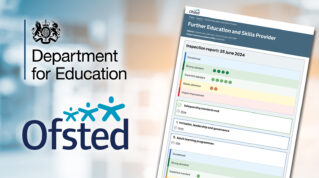The quality of education at general FE colleges has hit another record high, but the proportion of independent training providers achieving top Ofsted inspection grades has shrunk again.
FE Week analysis of latest official Ofsted data shows that the proportion of general FE colleges that hold a ‘good’ or ‘outstanding judgment sat at 91 per cent as of August 31, 2023.
This is a three percentage point rise compared to the same point last year and 14 percentage points higher than in 2021.
Sixth form colleges have also kept their proportion with the top two grades at 100 per cent for the second year in a row.
Independent training providers, however, saw the proportion of those holding a grade one or two fall to 71 per cent – the lowest since Ofsted’s education inspection framework was introduced in 2019.
This is four percentage points lower than the 75 per cent recorded at this point last year and nine percentage points lower than in 2021.
Overall, the quality of the whole FE sector declined slightly if judged by Ofsted results. As of August 31, 2023, 79 per cent of all FE providers held a grade one or two, down from 81 per cent at the same point last year.
There were 37 full inspections this year of previously ‘outstanding’ providers. Of those, 15 retained the grade, 18 dropped to ‘good’, and four fell to ‘requires improvement’.
FE Week’s analysis comes ahead of tomorrow’s launch of Ofsted’s annual report for 2023.
General FE college quality rises
While the overall proportion of grade one and two general FE colleges has risen to 91 per cent, the in-year data for 2022/23 shows a slightly different picture.
There were 52 GFE inspections between September 1, 2022 and August 31, 2023. Of those, 40, or 77 per cent, received the top two grades.
The reason for the overall rise in general FE colleges with ‘good’ or better can be due to multiple factors, including Ofsted grades being wiped out following mergers, which often involve weaker performing colleges.
‘Reasonable’ results in first year of new college skills measure
Enhanced inspections for colleges launched in September 2022 and includes an assessment of how well the college is contributing to addressing skills gaps in the local, regional and national economy.
The outcome of this assessment is not subject to a separate report, but included as a part of the overall inspection. Inspectors dish out one of three ratings for the skills contribution section – limited, reasonable or strong.
Out of the 51 colleges inspected, three were making a ‘limited’ contribution to meeting skills needs. These were New College Swindon, Coventry College and Strode College.
A further 30 were found making a ‘reasonable’ contribution, while 18 were making a ‘strong’ contribution.
Ofsted chief inspector Amanda Spielman told last week’s Association of Colleges conference that the “early results of our new judgement of skills needs are encouraging”.
She added: “Almost all the colleges inspected so far are making strong or reasonable contributions. And by the way, reasonable is a positive judgement, not a bad one. And the positive response from the sector to this work has been welcome.”
New providers slump ITP performance
The fall in the overall proportion of independent training providers (ITPs) that hold the top two Ofsted grades can be attributed, in part, to the number of new providers entering the market and receiving their first full inspection.
There were 594 ITPs that recorded their first Ofsted rating at of 31 August, 68 per cent of which received a grade one or two.
In 2022/23, 132 out of 209 independent providers – or 63 per cent – that weren’t previously inspected, were awarded the top two grades, the same proportion as data from 2021/22.
Overall, 71 per cent of all ITPs were rated ‘good’ or ‘outstanding’ as of August 31.
The Association of Employment and Learning Providers has previously said Ofsted inspections of ITPs were heavily weighted towards new providers and “drags” down and “dilutes” the figure for all ITPs.
This year, 143 of the 160 new provider monitoring visits scored ‘reasonable’ or ‘significant progress’ across all three themes – the highest proportion since NPMVs were introduced.
Ofsted said it carried out 15 follow-up safeguarding visits to providers that were judged to be making insufficient progress in safeguarding at their initial NPMV.
Meanwhile, 76 per cent of 1,256 providers with apprenticeship judgements were either good or reasonable progress.
Slight improvement in SEND colleges
The proportion of independent specialist colleges receiving grade one or two ratings from Ofsted improved by two percentage points to 77 per cent as of August 2023.
These SEND colleges provide post-16 education and training to young people and adults with learning difficulties and/or disabilities.
In 2021/22, seven were graded ‘inadequate’ compared to just four between 2017 and 2021.
In 2022/23, just one independent specialist college was awarded the bottom grade.
Prison education judgments still poor
The education of prisons or young offender institutions (YOIs) is still suffering.
This year, 91 per cent of the 43 prisons or young offender institutions were judged ‘requires improvement’ or ‘inadequate’ for overall effectiveness of education skills, and work provision.
In-year data shows no prison education institutions improved to ‘good’ or ‘outstanding’.
Instead, 12 prisons or YOIs declined from requires improvement to inadequate, three declined from good to inadequate and four institutions that were previously inadequate were judged inadequate again.
It means 31 per cent of institutions are now inadequate, up from 19 per cent last year.
















Would have been interesting to see University Ofsted Reports too given they have just come under the remit of Ofsted. It’s an intersting mix here too.
One might conclude Ofsted better understands the process of a college or school as this is where most of them come from! Specialism from ITP’s will always be commercially led without the stayed mechanism of traditional education, hence the disconnect. For example, not many Ofsted inspectors understanding new cloud technology, but show them a business administration course they are competent. Greater cpd for Ofsted in modern commercial and technological need and best practice, alongside constructive advice and management for Itps from Ofsted and the grades should improve.
Qualification delivery primarily has a 1-1 learner to provider relationship.
Other programmes have a 3-way learner, provider and employer relationship.
Perhaps Ofsted judgements are merely reflective of a general lack of understanding of the fundamental differences between the two.
Ditto for when you see people compare A level achievement rates to apprenticeships.